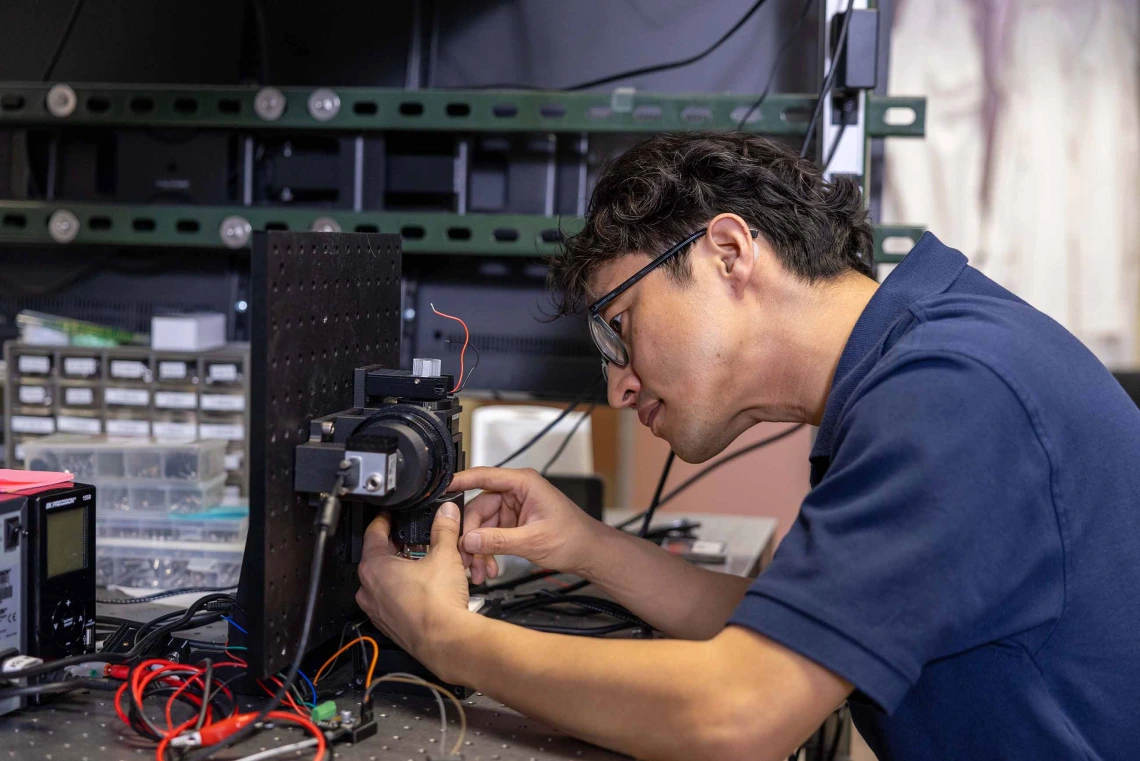$2.4M grant will fund imaging for chemotherapy-induced peripheral neuropathy
U of A Cancer Center researchers hope to image nerve endings and create objective, quantitative biomarkers for CIPN, leading to better treatment and prevention opportunities.

Dongkyun Kang, PhD, is creating a confocal microscope that might be able to help doctors diagnosis chemotherapy-induced peripheral neuropathy earlier.
Photo by Joshua Elz, University of Arizona Cancer Center
A University of Arizona Comprehensive Cancer Center researcher received a $2.4 million National Cancer Institute grant to develop a noninvasive, confocal microscope to examine nerve endings of cancer patients with chemotherapy-induced peripheral neuropathy in the hopes of identifying potential biomarkers for the disease.
Peripheral neuropathy is a common side effect of certain chemotherapy drugs. Chemotherapy-induced peripheral neuropathy, or CIPN, can be severe and debilitating, often causing physical limitations, including numbness, weakness and pain in the hands and feet of patients, and reduced quality of life.
Patients with CIPN are known to have a reduced number of Meissner corpuscles, which are nerve endings responsible for transmitting the sensations of light touch and low vibration. Dongkyun Kang, PhD, an associate professor of optical sciences at the U of A James C. Wyant College of Optical Sciences, hopes to use confocal microscopy images to find and count Meissner corpuscles, eventually leading to a potential imaging biomarker.
“CIPN symptoms can cause high levels of discomfort and present multiple challenges in the daily lives of cancer patients,” said Kang, who has an additional appointment in the U of A College of Engineering’s Department of Biomedical Engineering and is a member of the BIO5 Institute. “Using this approach, we may be able to identify CIPN earlier to stop symptoms from progressing and possibly prevent the condition altogether.”
“This study will build the evidence that our noninvasive microscopy approach can provide quantitative imaging biomarkers for CIPN monitoring, treatment and research.”
– Dongkyun Kang, PhD
Kang’s lab has pioneered low-cost confocal microscopy over the past seven years. His team was the first to demonstrate that noninvasive microscopy can be built at low cost, which makes it highly accessible in a wide variety of clinical settings.
“This study will build the evidence that our noninvasive microscopy approach can provide quantitative imaging biomarkers for CIPN monitoring, treatment and research,” Kang said. “This grant will also support a clinical study to evaluate the new microscope in patients with cancer who are undergoing chemotherapy.”
Kang said his goal is to change the diagnostic focus from subjective, qualitative markers, including patient and clinician questionnaires, to objective, quantitative biomarkers that could support personalized care for patients with CIPN.
“The work Dr. Kang has been doing exemplifies the Cancer Center’s approach to precision prevention and therapy,” said Dan Theodorescu, MD, PhD, the Nancy C. and Craig M. Berge endowed chair for the director of the Cancer Center. “I’m excited to see how his study evolves, especially given its potential for global impact.”
Kang’s co-investigators on the five-year grant include Clara Curiel-Lewandrowski, MD, a professor of medicine and chief of the Division of Dermatology at the U of A College of Medicine – Tucson, a co-director of the U of A Skin Cancer Institute and a BIO5 Institute member; and Denise Roe, DrPH, a professor at the Mel and Enid Zuckerman College of Public Health and the director of the U of A Cancer Center Biostatistics and Bioinformatics Shared Resource. Co-investigators from Guy’s and St. Thomas’ hospital are Sabrina Ramnarine, MD, PhD, and Majid Kazmi, MD. Co-investigators from Memorial Sloan Kettering Cancer Center are Milind Rajadhyaksha, PhD, and Kivanc Kose, PhD.
This research is supported by the National Cancer Institute, a division of the National Institutes of Health, under award no. 1R01CA301271-01.
Expert
Dongkyun “DK” Kang, PhD
Associate Professor, James C. Wyant College of Optical Sciences
Associate Professor, Department of Biomedical Engineering, U of A College of Engineering
Member, University of Arizona Comprehensive Cancer Center
Member, BIO5 Institute
Contact
Mark Anthony Febbo
University of Arizona Comprehensive Cancer Center
520-343-1289, markanthonyf@arizona.edu

